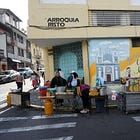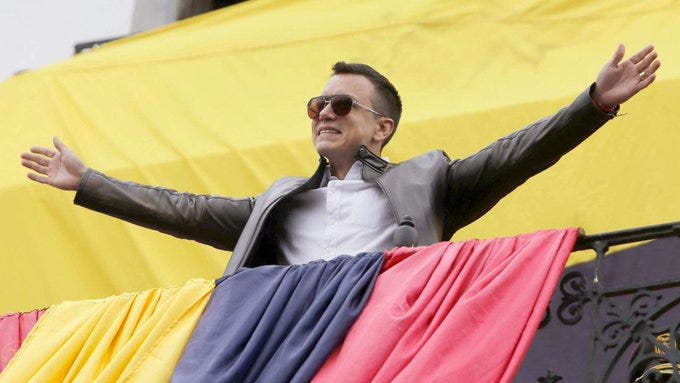Ecuadorian elections a choice between left or right-wing authoritarian drift
As fears of crime, violence, and migration take root, candidates offer voters "iron fist" policies, vague economic plans, and xenophobia

PWS will be providing live-updates to this story throughout the day. You can follow them at our website.
Ecuador goes to the polls today for the second round of elections amidst scandal, crisis, and a new “state of emergency” in seven of its provinces, including the capital of Quito.
Daniel Noboa, the right-wing incumbent, is facing off against Luisa Gonzalez after a first-round that resulted in an effective tie between the two candidates— Noboa squeaked out just 16,800 votes more than González.
Polls place the race too close to call in an election season that has been marred by polarization, political scandal, disinformation, and false accusations by both candidates.

Security is a key issue. The country experienced record levels of violence in 2023. In 2024, Noboa declared “war” on domestic crime, declaring a nationwide “state of exception” that granted broad powers to police and prosecutors. The murder rate dropped slightly as a result in 2024, but January 2025 was the deadliest month in the history of the country. During one week, the country experienced an average of one murder per hour, and 2025 homicide rates are on track to surpass those of 2023.
Noboa took office after winning special elections to replace then-President Guillermo Lasso, who invoked a never-before-used constitutional mechanism called the “muerte cruzada” or “crossed death” which dissolved both Congress and the Presidency.
Noboa’s “mano dura”, or “tough hand” approach to crime has been criticized by Human Rights Watch as well as civil liberties groups in Ecuador. Security forces have been accused of extrajudicial killings as well as forced disappearances.
Gonzalez, who has run on criticisms of Noboa that include his human rights records as well as corruption, this week drew attention to cocaine seizures at a banana shipping company owned by his family.
She has also often invoked xenophobic rhetoric against Venezuelan migrants in the country, whom she falsely accuses of raising crime rates and “stealing our jobs”.
She has promised to enact deportation procedures based on U.S. President Donald Trump's anti-migrant policies and to “repatriate” irregular Venezuelan migrants back to their home country.
Gonzalez, who represents the party of Rafael Correa, has promised to break with the legacy of the ex-president, who currently resides in Belgium following a corruption conviction in absentia, but she is still haunted by Correa’s legacy in a country that was deeply and bitterly divided over his administration.
Correa was sharply criticized, especially by left-leaning Indigenous organizations, after a turn towards authoritarianism and prosecution of Indigenous activists on dubious grounds.
Nonetheless, Pachakutik, Ecuador's indigenous party, endorsed Gonzalez this month, but many other indigenous organizations have opposed the move, fearful of her ties to a leader who conjures up bitter memories.
The country is also facing a long-term energy crisis, caused in part by low rainfalls in the country, which heavily relies on hydroelectric power as well as energy imported from Colombia — which has also been experiencing regional water shortages.
Neither candidate has offered a comprehensive plan to fix months of planned rolling blackouts that remove pressure on the electrical grid as an emergency preventative measure to prevent overload.
Many voters in Quito who spoke to PWS during the first round of elections in February expressed a distinct lack of enthusiasm over the available options, as well as election fatigue.
When Jaqueline Sánchez, waiting in line at a poll center, was asked if she was excited to vote, she rolled her eyes and laughed. “We’d love a third option,” she said. “But it’s the same thing again. And again. And Again.”
Voting is mandatory in Ecuador, and the country has held three presidential elections and two congressional elections in two years due to Lasso not finishing his term and dissolving the legislature.
Many Ecuadorians believe that if Gonzalez wins, she will bring Rafael Correa back from exile. Many Correistas, who have long claimed the charges against him were “lawfare” and politically motivated, welcome the move.
But right-wingers, as well as many indigenous communities who trend left, strongly oppose the possibility — a concrete illustration of deepening political polarization in Ecuadorian society.
Questionable decisions by Noboa, however, have only deepened that gulf. The President, who often appears in public wearing aviator sunglasses and a leather jacket, is the son of the richest man in Ecuador.
He has been accused of weakening democratic institutions as well as bending, if not outright breaking, election laws. Ecuadorian law mandates that candidates who hold political office must temporarily abdicate power during the official election season, which Noboa has refused to do.
In theory, that should have led to the temporary appointment of Vice President Verónica Abad. But Noboa has spent months trying to remove her from power — first via a decree that was struck down by the courts, and then via the Electoral Courts, who suspended Abad’s ability to run for elected office for two years over charges of “political gender violence”.
Noboa claims this status makes her effectively ineligible to hold office and has attempted to sideline her. Abad denounces the process as well as Noboa himself, who she says is “totally out of control”.
Noboa also claimed that elections in February, which many polling companies failed wildly to accurately predict, were marred by fraud. He provided no evidence of the claims, which were rejected by international and national election observers.
The comments, however, have left some analysts wondering how he will react to a slim loss in the second round. In an interview with Ecuadorian media this week, Noboa said he would accept election results “only if there is evidence there wasn’t fraud”.
He asked Ecuador's election commission to ban phones in the voting booths, claiming that organized criminal groups were pressuring citizens to vote for Gonzalez and demanding photographic proof of their ballots.
On March 8 of this year, gangs killed 22 people in an attack on a neighborhood in Guayaquil, shocking the country. In response, President Noboa announced preemptive pardons for military and police operating in the area. He later expanded the measure to all security forces nationwide.
In addition to the recent state of emergency declared on the edge of a razor-sharp election, the announcement of preemptive pardons has raised fears that security forces will act more aggressively, potentially committing more human rights violations out of a sense of impunity.
Gonzalez, however, is in a tough position to push back against authoritarian creep or institutional capture. Correísmo, the name given to the political philosophy of Rafael Correa, is synonymous with censorship, political persecution of dissenters, and plenty of authoritarian security policies.
But the polarizing leader also brought record economic growth to Ecuador and instituted massive public spending plans and poverty alleviation efforts.
Since he left office, Ecuadorian politics has effectively been an ideological battle between his supporters and his critics. As Sánchez, the voter in Quito said, this election is no different. “It’s the same thing again. And again. And Again.”
The Big Headlines in LATAM
Opposition politicians in Panama have accused the United States of launching a “camouflaged invasion” of the country after President Donald Trump confirmed the deployment of US soldiers days after the two countries signed a security pact. (Per Al Jazeera)
US Defense Secretary Pete Hegseth has been negotiating with the country for weeks over a series of deals that, according to him, save “the Panama Canal from Chinese influence”.
A roof collapse at a nightclub in the Dominican Republic during a performance by merengue singer Rubby Pérez, killed 221 people, including the singer.
What we’re reading
Our friends Douwe and Anastasia, who contribute here to PWS, have an excellent long-form piece out this week at Al Jazeera that breaks down the complex dynamic among indigenous communities in Ecuador over presidential elections.
We mention the dynamic in our above feature, but if you’re curious about the details on how those communities feel about the possible return of Correísmo, as well as their history with Rafael Correa himself, you couldn’t find a better place to find them.
Ship’s Log
This week PWS will begin launching daily updates on breaking news stories in LATAM. We’ll fill you in on the details soon, but this will be a second newsletter, hosted at our same home-site.
The bulletin will be mini-briefs on the latest stories Monday through Friday. You’ll get a briefing on that when we launch this coming week. The pirate newsroom is about to get a lot busier, but we’re excited to batten down the hatches and really dig into the regional news cycle.
We will also be focusing on migration as part of those efforts, a topic with a lot of movement lately as Trump enacts radical changes to migration enforcement policy that reverberates across all of the Americas.
Spanish Word of the Week
Arrunchar(se)
This distinctly Colombian slang term means “to cuddle”.
In Bogota, for example, you might hear “Está lloviendo hoy, arrunchémonos a ver una peli”
”It’s raining today, let’s stay in bed, cuddle and watch a movie.”
Colombians really like cuddling, even the guys who try to act all macho in public. We find this adorable. Also, for the record, we are big fans of cuddling ourselves.




